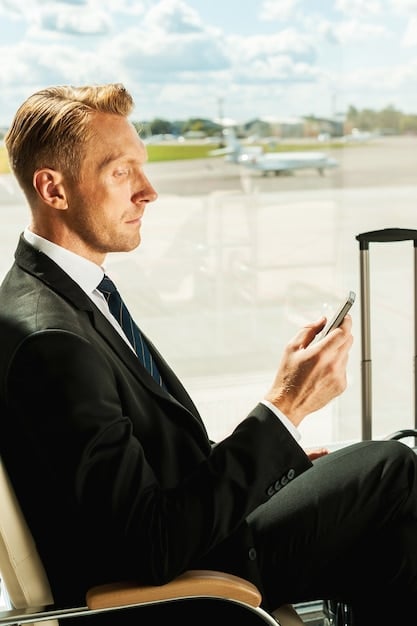Travel Hacking for Business Travelers: Maximize Rewards & Minimize Expenses

Anúncios
Achieving optimal Travel Hacking for Business Travelers: Maximize Your Rewards and Minimize Your Expenses involves leveraging loyalty programs, strategic credit card use, and smart booking practices to transform essential business trips into opportunities for substantial financial gain and enhanced travel experiences.
Anúncios
For the discerning professional, business travel isn’t just a necessity; it’s a strategic playing field. The art of Travel Hacking for Business Travelers: Maximize Your Rewards and Minimize Your Expenses involves converting mandatory trips into significant personal benefits. This comprehensive guide delves into how savvy business travelers can strategically accumulate points, miles, and perks while simultaneously reducing their out-of-pocket expenses, turning every journey into a smart financial move.
Understanding the Core of Business Travel Hacking
Business travel presents a unique opportunity for travel hacking that leisure travelers often miss. The consistent, often high-value spend on flights, hotels, and ground transportation mandated by corporate policies can be leveraged to accrue an immense amount of rewards. This isn’t about compromising productivity or company policy; it’s about optimizing within existing frameworks.
Anúncios
The fundamental principle lies in understanding loyalty ecosystems: how airlines, hotels, and credit card companies reward frequent customers. Many business travelers merely book the cheapest or most convenient option without considering the long-term benefits of brand loyalty or strategic credit card use. By shifting this mindset, every booking becomes a tactical decision aimed at maximizing personal returns.
The Power of Corporate Travel Policies
Many companies have preferred vendor agreements or specific booking platforms. While these might seem restrictive, skilled travel hackers often find ways to work within or around these systems. For instance, if your company mandates a specific airline, focus on maximizing your status and benefits with that airline. If direct booking is allowed, always check for personal loyalty program benefits.
- Leverage Preferred Vendors: Achieve elite status faster with airlines or hotel chains frequently used by your company.
- Understand Reimbursement Policies: Know what expenses are covered and how you can earn points on those.
- Align Personal and Business Goals: Choose options that benefit both your work commitments and personal reward aspirations.
The goal is to turn corporate expenses into personal assets. This requires an initial investment of time to research and set up accounts, but the returns, in terms of free travel, upgrades, and exclusive perks, can be substantial. It transforms a routine part of your job into a continuous stream of personal advantages, making business travel less of a chore and more of an opportunity for enhancement.
Ultimately, discerning business travel hacking is a blend of strategic planning and consistent execution. It’s about being informed and proactive, ensuring that you’re always getting the most out of every mile traveled and every dollar spent on behalf of your employer. This approach aligns personal well-being with professional demands, creating a mutually beneficial arrangement where your work directly funds your adventures.
Strategic Credit Card Selection for Business Travelers
Choosing the right credit cards is arguably the cornerstone of effective business travel hacking. For business travelers, the options extend beyond personal travel cards to include specialized business credit cards, which offer unique benefits tailored for corporate spending. The key is to select cards that align with your predominant spending categories and offer the most valuable rewards currency.
Many business credit cards offer significantly higher earning rates on categories like office supplies, internet/phone services, or advertising, beyond the typical travel and dining bonuses. They also provide features like employee cards with spending controls, detailed expense reporting, and potentially, higher credit limits suitable for extensive business outlays. Understanding these nuances is crucial.
Maximizing Welcome Bonuses and Category Spending
The initial welcome bonus from a new credit card can be a game-changer. These bonuses often require a significant spending threshold within a few months, which business travel expenses can easily help meet. Beyond that, focus on cards that offer bonus points on categories where your business incurs significant costs.
- Large Welcome Bonuses: Target credit cards with substantial sign-up bonuses, planning your application around upcoming large business expenses.
- Category Spends: Opt for cards that give multiplied points on travel, dining, or specific business-related expenditures.
- Annual Fee Justification: Evaluate if the annual fee is offset by benefits like lounge access, statement credits, or elite status shortcuts.
Furthermore, consider cards that offer flexible points programs (e.g., Chase Ultimate Rewards, American Express Membership Rewards). These points can be transferred to various airline and hotel partners, offering more redemption versatility than co-branded cards tied to a single loyalty program. This flexibility is invaluable for a business traveler whose needs or preferred travel partners might change.

The annual fee associated with premium travel and business credit cards can be intimidating, but their benefits often far outweigh the cost. Perks like complimentary lounge access, travel insurance, expedited security, and hotel elite status can transform a taxing business trip into a more comfortable and efficient experience. Calculate the monetary value of these perks against the annual fee to determine if a card is a net positive.
Ultimately, a well-curated credit card portfolio is dynamic. As your business travel patterns or company policies evolve, so too should your card strategy. Regularly review your spending habits and card benefits to ensure you’re always optimizing your reward accumulation and taking full advantage of the perks available to you as a dedicated business traveler.
Mastering Airline and Hotel Loyalty Programs
For the business traveler, airline and hotel loyalty programs are not just about earning free flights or nights; they are conduits to a significantly enhanced travel experience. Achieving elite status unlocks a plethora of benefits that can transform grueling itineraries into more comfortable and productive journeys.
Airline elite status often means complimentary upgrades, priority boarding, lounge access, extra baggage allowance, and dedicated customer service lines. For hotels, elite status can grant room upgrades, late check-out, free breakfast, executive lounge access, and bonus points on stays. These perks save time, money, and reduce stress, directly impacting a busy professional’s well-being on the road.
Accelerating Elite Status and Maximizing Benefits
Many loyalty programs have pathways to elite status beyond just flying or staying. Co-branded credit cards often come with automatic status or spending thresholds that accelerate elite qualification. Some programs also offer status matches or challenges, allowing you to leverage existing status with a competitor to gain equivalent status on a new program.
- Status Challenges/Matches: Explore opportunities to fast-track elite status with new airlines or hotel chains based on your current high-tier status elsewhere.
- Co-branded Credit Cards: Utilize credit cards that offer automatic elite status or spending accelerators towards status.
- Strategic Booking: Consolidate your business travel with one or two preferred airlines and hotel chains to concentrate your earning and qualify for elite tiers faster.
- Booking Direct: Always book directly with the airline or hotel to ensure you earn loyalty points and receive elite benefits. Third-party sites often disqualify you from these.
Beyond traditional accumulation, savvy travelers look for bonus offers and promotions. Airlines and hotels frequently offer double points, triple points, or specific bonuses for certain routes or properties. Signing up for email newsletters and regularly checking program websites can help identify these lucrative opportunities.
Even if your company has strict booking policies, try to ensure your loyalty numbers are always included in reservations. Even a small number of points from each trip can add up over time, and every segment flown contributes to elite status qualification. Remember, maintaining elite status often comes with soft benefits like better service recovery during disruptions, which is invaluable for business travel.
The ultimate goal is to create a symbiotic relationship where your regular business travel expenditure directly fuels your personal travel aspirations and enhances your day-to-day experience on the road. By strategically leveraging every flight and every stay, the business traveler can convert corporate necessity into personal luxury.
Optimizing Booking Strategies and Price Hacking
While loyalty programs and credit cards are foundational, effective travel hacking also heavily relies on smart booking strategies and understanding how to truly “hack” prices. This involves more than just finding the cheapest fare; it’s about optimizing value, flexibility, and rewards within your company’s travel policies.
One critical aspect is understanding dynamic pricing. Airfare and hotel rates fluctuate significantly based on demand, time of booking, and even the device you’re using. Business travelers often have less flexibility with dates, but they can still leverage tools and tactics to ensure they’re not overpaying. This often means booking early when possible, or strategically during off-peak times if your schedule permits.
Leveraging Travel Portals and Direct Bookings
The tension between using corporate travel portals and direct booking is a common one. While corporate portals ensure policy compliance and simplified expense reporting, direct bookings with airlines and hotels are almost always necessary to earn elite night/mile credit and redeem elite perks. Sometimes, it’s possible to book via the portal and then add your loyalty numbers directly with the provider, but confirm this beforehand.
- Price Tracking Tools: Use tools like Google Flights, Skyscanner, or specific hotel chain apps that track price changes and alert you when fares drop for your intended routes.
- Flexible Dates/Times: If your business schedule allows, even slight flexibility with departure days or times (e.g., flying on a Tuesday instead of Monday) can yield significant savings.
- Airline/Hotel Alliances: Understand airline alliances (Star Alliance, SkyTeam, OneWorld) and hotel brand families. This allows you to earn and redeem points across multiple partners, increasing flexibility.
- Stacking Promotions: Look for opportunities to combine credit card bonuses with airline or hotel promotions to earn multiple layers of rewards on a single booking.
“Hidden city” ticketing or “back-to-back” hotel stays are advanced tactics rarely suitable for corporate travel due to policy violations and the need for schedule adherence. However, understanding alternative airports or slightly longer layovers could be viable options if they don’t impact your business objectives and are allowed.

Another crucial element is understanding cancellation and change policies. Business travel can be unpredictable. Opting for slightly more expensive flexible fares or refundable hotel rates might pay off if your schedule is prone to last-minute changes. The value of avoiding cancellation fees or needing to rebook at inflated prices can far exceed the initial premium.
Finally, always cross-reference. Even after identifying a seemingly good deal, quickly check other platforms or the direct airline/hotel website. Sometimes, direct bookings offer exclusive rates or packages not available elsewhere, especially for loyalty members. This diligence ensures you’re truly optimizing your bookings for both cost and reward accumulation.
Hacking Ground Transportation and Everyday Spending
While flights and hotels constitute the bulk of business travel expenses, ground transportation and everyday spending during trips should not be overlooked. These seemingly smaller categories can collectively add up to significant opportunities for reward accumulation and expense reduction. The same principles of strategic credit card use and loyalty apply.
For ground transportation, this includes rental cars, taxis, ride-sharing services, and public transport. Each offers avenues for optimization. For everyday spending, think about meals, coffee breaks, incidental supplies, and any other reimbursable expenses incurred while on duty. Every dollar spent is a potential point earned or a cost minimized.
Leveraging Rental Car Programs and Ride-Sharing Benefits
Many major rental car companies have loyalty programs that offer upgrades, expedited pick-up, and free rental days. Similar to airlines and hotels, consolidating your rentals with one company can accelerate benefits. Some premium credit cards also offer primary rental car insurance, saving you the daily insurance fee, and elite status with rental agencies.
- Rental Car Loyalty Programs: Sign up for programs like Hertz Gold Plus Rewards or National Emerald Club for expedited service and potential upgrades.
- Credit Card Rental Benefits: Use credit cards that offer complimentary rental car insurance or elite status with car rental companies.
- Ride-Sharing Perks: Link your ride-sharing accounts (Uber, Lyft) to credit cards that offer bonus points on travel or specific categories. Some also have their own rewards programs.
- Public Transport Apps: Utilize apps that allow pre-loading funds for public transport, often with minor discounts, or link to travel-focused credit cards.
As for everyday spending, it’s often covered by your credit card strategy. Using a card that offers bonus points on dining, even for quick meals or coffee, can add up quickly. If your company provides a per diem, any savings you achieve on meals or incidentals directly translates into additional savings for yourself, as long as it aligns with policy.
Be mindful of foreign transaction fees if you travel internationally. Many premium travel credit cards waive these fees, saving you 2-3% on every international purchase. This is a subtle but significant way to minimize expenses without compromising on your travel necessities. Always check your card’s terms for international travel.
Another smart move is to use shopping portals. Before making any online purchase related to your trip (e.g., luggage, travel accessories, even booking flights/hotels through specific channels if allowed), check if there’s a shopping portal (like Rakuten, TopCashback, or specific airline/hotel portals) that offers bonus miles or cashback for that retailer. These are “set it and forget it” ways to earn extra rewards.
By consciously analyzing how you handle ground transportation and minor expenses, you ensure that every aspect of your business trip is contributing to your overall travel hacking goals. It’s about being holistic in your approach, leaving no stone unturned in the quest to maximize value and minimize costs.
Advanced Travel Hacking Tactics for the Business Professional
Once you’ve mastered the fundamentals of credit card optimization, loyalty programs, and smart booking, you can delve into more advanced travel hacking tactics. These strategies often require a deeper understanding of program intricacies and a willingness to be more proactive in seeking out opportunities, but they yield significantly higher returns.
One such tactic is “manufactured spending,” though its applicability to business travelers is often limited by company policy. However, understanding how to maximize spending on things you’d pay for anyway, such as taxes or utilities, through specific portals or payment methods that code as purchases and not cash advances, can be a valuable skill for personal reward accumulation.
Leveraging Gaps and Arbitrage Opportunities
Advanced hackers look for “arbitrage” opportunities where the value of points or miles greatly exceeds their cost, or where specific promotions can be stacked for outsized returns. This might involve purchasing discounted gift cards for airlines or hotels, or taking advantage of short-term promotions that offer extremely high earning rates.
- Point Devaluation Awareness: Stay informed about upcoming changes to loyalty programs, as airlines and hotels periodically devalue their points. Redeeming strategically before devaluations can save substantial value.
- Award Chart Sweet Spots: Research award charts (if applicable) for partner airlines or hotels to find “sweet spots” where redemptions offer exceptionally high value for short distances or specific routes/properties.
- Strategic Use of Travel Credits: Maximize statement credits offered by premium credit cards for airlines, hotels, or incidentals. These often cover the annual fee if used diligently.
- Flexibility with Redemption: Be flexible with your travel dates and destinations for personal redemptions. Using points during off-peak seasons can stretch your rewards significantly further.
Another advanced technique involves understanding airline and hotel transfer partners. Flexible point currencies (like Chase Ultimate Rewards or Amex Membership Rewards) gain immense value because they can be transferred to various airline and hotel loyalty programs. This allows you to pick the program with the best redemption value for a specific trip, rather than being tied to one carrier.
The concept of “status matching” is also crucial for sophisticated travelers. If you achieve top-tier status with one airline or hotel, you can often request a status match with a competitor. This can grant you elite benefits across multiple programs without having to re-qualify from scratch, offering incredible versatility and convenience across different travel scenarios.
Furthermore, consider leveraging business conference and event affiliations. Many industry conferences partner with specific airlines or hotels for discounts. While this may not directly yield hacking benefits, it ensures cost efficiency, freeing up personal funds or per diems for other strategic spending opportunities that do yield rewards. It’s about optimizing the ecosystem holistically.
Ultimately, advanced travel hacking is about continuous learning and adaptation. The landscape of loyalty programs, credit card benefits, and airline/hotel policies is constantly evolving. Staying on top of these changes, reading industry blogs, and participating in online forums can keep you ahead of the curve, ensuring you’re always employing the most effective strategies to maximize your rewards.
Maintaining Compliance and Ethical Hacking
As a business traveler, the pursuit of maximizing rewards must always be balanced with maintaining compliance with company policies and upholding ethical standards. “Travel hacking” in a corporate context is about optimization, not circumvention or exploitation of company resources. The line between smart strategy and problematic behavior can be fine, and it’s imperative to stay on the right side of it.
The primary concern is often how personal rewards are accrued on company-funded travel. Most corporate policies permit employees to keep frequent flyer miles, hotel points, and credit card rewards earned on business expenses, as these are typically considered personal benefits. However, certain practices, such as booking unnecessarily expensive options just for personal gain, or intentionally missing flights to optimize itineraries (“skiplagging”), are generally frowned upon and can lead to serious repercussions.
Key Considerations for Ethical Travel Hacking
Transparency is paramount. If you’re unsure about a specific tactic, it’s generally best to err on the side of caution or seek clarification from your company’s travel or HR department. Operating within the spirit of the company’s rules, rather than just the letter, builds trust and avoids potential issues.
- Company Policy Adherence: Always review and understand your company’s travel and expense policies. Ensure your travel hacking strategies do not violate any rules or guidelines.
- Cost-Effectiveness: Your primary goal for business travel expenses should always be to secure the most cost-effective and efficient solution for your company, not to maximize personal gain at corporate expense.
- Reimbursement Integrity: Ensure all expense reports accurately reflect actual costs incurred and adhere to reporting standards. Do not inflate expenses or claim non-reimbursable items for points.
- Professional Reputation: Consider how your actions reflect on your professional image. Avoiding practices that could be perceived as self-serving or unethical is critical for career longevity.
Another area of focus is the use of personal credit cards for business expenses. While this is often the most effective way to earn personal rewards, ensure your company’s reimbursement process is quick and reliable. You don’t want to incur interest charges on your personal card waiting for corporate reimbursement.
Be mindful of “churning” credit cards too frequently solely for welcome bonuses, especially business credit cards that are linked to your personal credit score. While a common travel hacking strategy, applying for too many cards in a short period can negatively impact your credit and potentially raise red flags with lenders or even your employer if it becomes excessive.
Ultimately, responsible travel hacking for business travelers is about smart optimization. It’s about leveraging the systems in place to your advantage, without compromising company integrity or your professional standing. By approaching travel hacking with an ethical mindset and a clear understanding of boundaries, you can indeed maximize your rewards and minimize your expenses, transforming every business trip into a value-added experience, both for yourself and, indirectly, for your employer through efficient and strategic travel management.
| Key Point | Brief Description |
|---|---|
| 💳 Strategic Credit Cards | Select business and personal cards offering optimal rewards on travel & business expenses, leveraging welcome bonuses. |
| ✈️ Elite Status Acceleration | Focus on airline and hotel loyalty programs to quickly earn elite status for upgrades, lounges, and perks. |
| 💡 Smart Booking & Savings | Utilize price tracking, strategic direct bookings, and understanding dynamic pricing for value. |
| ⚖️ Ethical Compliance | Always ensure all hacking strategies comply with company travel policies and ethical guidelines. |
Frequently Asked Questions About Business Travel Hacking
Yes, generally, travel hacking is ethical if done within company compliance. Most companies allow employees to keep personal rewards (miles, points) earned on business travel. The key is to avoid practices that inflate expenses or violate company policies to gain personal benefits. Transparency and good judgment are crucial to maintain integrity and trust.
For maximizing personal rewards, a personal travel credit card is often better, as its rewards directly benefit you. However, ensure company policy permits this and that their reimbursement process is efficient to avoid personal interest charges. Business credit cards, while beneficial for company tracking and specific business expenses, may offer more limited personal reward-earning opportunities.
Concentrate your business travel with one or two preferred airlines and hotel chains to meet their elite qualification thresholds sooner. Leverage co-branded credit cards that offer automatic status or spending accelerators. Additionally, explore status match or status challenge opportunities if you have elite status with a competitor program to fast-track recognition elsewhere.
“Stacking” refers to combining multiple reward-earning opportunities on a single transaction. For example, you might book a flight using a credit card that gives bonus points on travel, through an airline’s shopping portal for extra miles, and simultaneously earn elite qualifying miles from the airline. This multiplies the rewards earned from one expense.
Many premium travel credit cards offer various insurance benefits, such as trip delay/cancellation coverage, baggage loss, and rental car insurance. When you pay for your business travel expenses with these cards, you are often implicitly covered. It’s crucial to check your specific card’s guide to benefits and confirm coverage details before relying on them for corporate travel.
Conclusion
For the modern professional, business travel extends far beyond mere logistics; it’s an intricate dance of strategy and opportunity. By diligently applying the principles of travel hacking—from smart credit card usage and dedicated loyalty program engagement to astute booking tactics and ethical compliance—business travelers can transform what might otherwise be a taxing necessity into a continuous source of personal rewards and enhanced experiences. This holistic approach not only minimizes out-of-pocket expenses for the individual but also fosters a more comfortable and efficient travel rhythm, ultimately benefiting both the professional and their organization.





